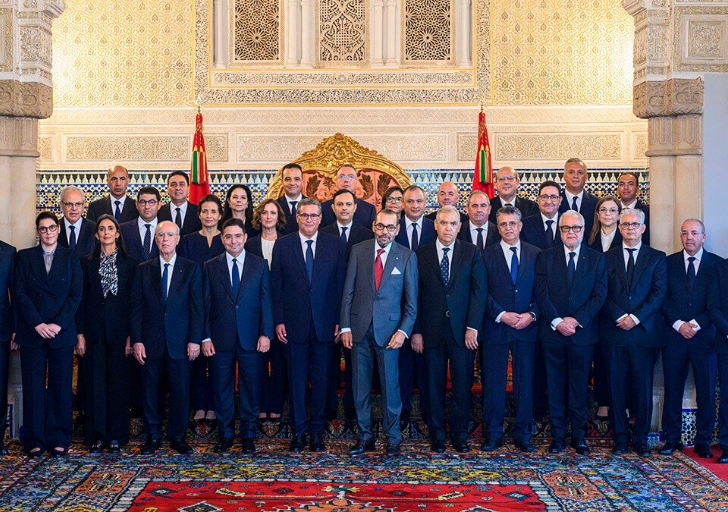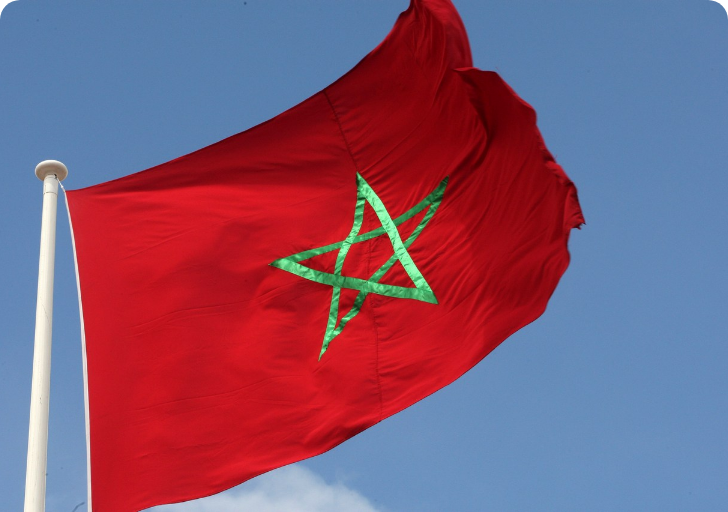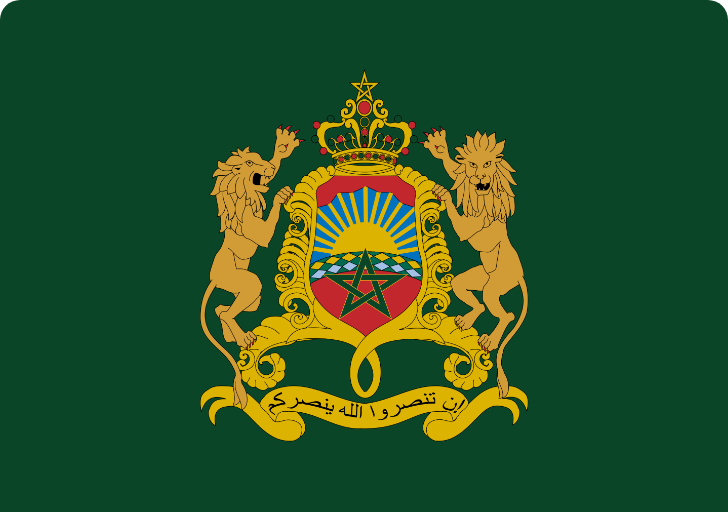HM the King Sends Message to Participants in 2017 Annual Joint Meetings of Arab Financial Institutions
HM King Mohammed VI has sent a message to the participants in the 2017 Annual Joint Meetings of Arab Financial Institutions, held Tuesday in Rabat.
Here is the full text of the Royal Message, which was read by minister of Economy and Finance, Mohamed Boussaid.
"Praise be to God
May peace and blessings be upon the Prophet, His Kith and Kin
Mr. Chairman,
Your Excellencies,
Ladies and Gentlemen,
It gives me great pleasure to send you this message, at the opening of the 2017 Annual Joint Meetings of Arab Financial Institutions, to which I have granted my patronage, given the leading role your institutions play in supporting economic and social development in Arab countries.
I should like to extend a warm welcome to the heads and members of delegations participating in this important meeting.
This is the fifth time your second home - Morocco - has had the honor to host your meeting. This is a clear indication of how keen the Kingdom of Morocco is to continue its action to promote inter-Arab cooperation and make an active contribution to achieving the desired economic integration.
These meetings are an opportunity for you to take stock of funding activities and adopt your institutions' financial statements for the preceding year. I think they are an occasion to assess achievements in terms of supporting social and economic development in Arab countries, and to explore the best ways to enhance South-South cooperation.
Your meetings also provide a yearly opportunity to reflect on your institutions’ future action given, in particular, the critical developments affecting the countries in the region as well as the common economic, social and development challenges they are facing.
In this regard, I should like to praise Arab financial institutions for their tireless efforts, both in terms of the scope of funded programs and projects as well as the substantive support and the quality of the expert services provided.
Nevertheless, and despite the major accomplishments made, there is still an urgent need to expand the scope of Arab financial institutions’ action and further enhance their services and programs, given our countries’ growing needs, the ambitious expectations of our peoples, the need to revamp Arab economies and the necessity to achieve sustainable development goals, including those related to climate change, to greater environmental security and safety, and to the optimal use of natural resources.
These are, in fact, the policy guidelines we have set for Morocco. The organization, last November in Marrakesh, of the COP22, clearly attests to this strategic orientation, besides being an international acknowledgement of the efforts Morocco has been making in those areas.
Your Excellencies,
Ladies and Gentlemen,
Arab countries are facing real, intertwined challenges due to geo-strategic developments, protracted slackening of global economic activity and international trade as well as volatile commodity prices on international markets, all of which impact economic activity in the region.
These factors make it harder to control financial balances. They also compound challenges relating to economic stability and hamper the achievement of comprehensive, sustainable development. Notwithstanding some improvement, growth forecasts for Arab countries are still below expectations, and are insufficient to address growing unemployment rates, particularly among young people.
Most Arab economies have proven to be resilient in the face of the above developments, thanks to bold, structural reforms in the financial and economic domains, the provision of incentives to the private sector and the adoption of strategies to diversify the economic fabric. Nevertheless, there is an urgent need to step up efforts in order to achieve social justice and set up and generalize social safety nets.
Our Arab financial institutions are called upon today, more than ever, to react positively to the major changes and development needs witnessed in the Arab region, to pool efforts in order to support economic and financial reforms, to diversify and boost Arab economies and to achieve Arab integration.
In this respect, supporting small and medium-size projects, creating job opportunities for young people, empowering women, promoting development in rural areas, curbing poverty and vulnerability and training the human resources that are capable of rising to development and security challenges are key issues that should be a priority for our financial institutions in the years to come.
Human capital, just like the intangible capital, is our countries’ foremost asset. It must be placed at the heart of public policy priorities, given the increasingly important role human resources play in achieving development and promoting cultural influence.
In keeping with the above, I call upon Arab financial institutions to strive doubly hard to encourage inter-Arab investment, given the part it plays in achieving sustainable development, and to provide incentives to the private sector as an engine for the promotion of development and a creator of wealth.
Arab financial institutions have played a pivotal role in financing infrastructure development projects, and we all know the crucial impact of such projects at local and sectoral levels. Today, one of the priorities that need to be addressed is the promotion of development projects that support Arab economic integration and make Arab economies more open to their regional environment, particularly Africa. These projects should cover various fields, such as energy and infrastructure in order to promote electrification as well as land, railroad and maritime transport, in addition to agricultural projects to achieve food security.
Seen from this perspective, Arab financial institutions are expected to keep up their action to make sure large-scale regional and continental projects are turned into reality. Indeed, achieving progress and development in the Arab region in isolation from its regional environment is hard to imagine.
I should like to stress, in this regard, that supporting the development efforts of African countries should not only remain a priority as far as our joint Arab action is concerned, but also serve as a tangible model of South-South cooperation.
It is a matter of deep satisfaction that, in addition to your institutions’ role as leading development bodies in the field of inter-Arab cooperation, their efforts and funding have gone beyond the borders of the Arab world, extending to African countries as well. Your institutions have therefore been contributing to strengthening cooperation and solidarity between the two groups.
Having significant economic potential and leading public institutions and private enterprises that are pioneers in the area of solidarity-based partnerships in Africa, Morocco is keen to place its skilled human resources as well as the expertise it has gained in various fields at the disposal of Arab financial institutions in order to contribute to expanding the development capabilities of African countries.
The flagship gas pipeline project between Nigeria and Morocco is a model of South-South cooperation, which should be supported by Arab financial institutions.
In this respect, I keenly look forward to building on Morocco's reintegration of the African Union to consolidate Arab-African cooperation and promote regional integration.
Your Excellencies,
Ladies and Gentlemen,
You know, I am sure, that Morocco has been and will remain committed to boosting joint Arab action.
Being firmly convinced of the role the economy plays in consolidating Arab unity - a goal we all aspire to achieve - I very much look forward to seeing our joint action expanded in order to give fresh impetus to inter-Arab economic relations and open up broader horizons for trade to serve shared Arab interests and contribute to achieving the economic progress and prosperity our peoples are yearning for.
I should like, in this respect, to express my heartfelt thanks to Arab financial institutions for supporting economic and social development in the Kingdom of Morocco, by contributing to financing development and investment projects.
I also wish to express my sincere thanks and deep gratitude to sister Gulf nations - with which we have a special, strategic partnership - and say how much I appreciate the support they have been giving to Morocco, both moral and material, for the achievement of development projects, as well as their backing to defend my country’s just causes.
Your Excellencies,
Ladies and Gentlemen,
I am sure your great competence, your vast experience, your keen sense of responsibility, your earnest desire to uphold Arab causes and your commitment to fulfilling the aspirations of Arab peoples will encourage you to strive even harder to support the financing of economic growth and social progress, and to contribute to tackling the development challenges confronting us all.
I am confident that your meetings will, by the Grace of the Almighty, help you to come up with practical decisions and recommendations as well as concrete initiatives to serve the interests of our peoples and build further bridges for interaction, solidarity and complementarity between our countries.
I welcome you, once again, to your second home - the Kingdom of Morocco - and pray that Almighty God grant you every success.
Wassalamu alaikum warahmatullah wabarakatuh".
MAP 18 April 2017







